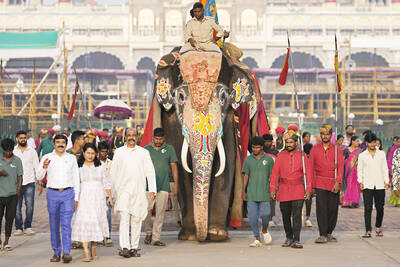Liao Wu-hsiung (廖武雄) won his first national bicycle motocross, or BMX, competition in 1983 — when he was in fifth grade. He went on to successfully defend the title twice until, at age 15, he broke his leg in a car accident. A year later he was back in top form and won the national BMX championship three more times. Since 1996 he has been training young athletes and his students regularly garner victories at extreme sports races both at home and abroad.
Liao recalls his start in extreme bicycling: “BMX came to Taiwan at the beginning of 1980. I got on my first bike in December of that year.” Taiwan’s first extreme bikers raced on streets without helmets or protective gear of any kind. No one seemed to know what exactly what they were doing. But Liao, a shy boy, soon had fans running after him. “I call the years from 1980 to 1984 the ‘Boxer Rebellion’ (義和團) period,” the 37-year-old said. “We jumped, fell over, broke our arms. We got up, wiped off the blood and tried again. We were heroes.”
The pioneering cyclists devised a cross-country itinerary as Liao and his gang traveled from one city to another on weekends to race local teams, events that sometimes drew 2,000 to 3,000 participants and cheering fans.
The media latched on to the street fad in a blitz of negative coverage, and panic ensued. Schools banned bicycles that resembled BMX bikes. Cyclists in groups of 10 or more were pulled over and had their tires deflated by the police, though Liao says the agile bikers were difficult to catch.
“Having a BMX bike was the coolest thing back then, even cooler than having a big motorcycle. But in the eyes of teachers and parents, we were just a notch above drug addicts. You had to be in the bad-boy club to be on a BMX bike,” Liao said.
The Chinese Taipei Cycling Association
(中華民國自由車協會) recognized the sport with regulations and races in 1983 and created a platform for competitors, who had previously been derided as street punks. In 1986 Liao became the first Taiwanese extreme biker to compete abroad and won the Pacific regional BMX tournament in Canada. He was dubbed the “Bike God of Asia” (亞洲車神) by local media after winning ESPN, Nutrilite World Cup and Philips X-Rage extreme competitions in 2000 and 2001.
From 2005 to 2007, Liao was the titleholder of an international four-cross race in China. He was then “banned” from the competition when the organizer complained no one would participate in the race if Liao was competing.
Not surprisingly, Liao’s pet phrase is “It will happen if you want to make it happen.” When his doctor said it might take 10 years before he could walk in a normal fashion and warned he might never run again after he broke his right leg in 1987, Liao recalls thinking: “It’s my leg. It will move if I want it to.” Without telling his parents, the teenager soaked his leg, which he could barely move, in hot water for one hour each day, then hung a 20kg weight on it and attempted to bend his leg slightly for another three to five hours. He figured that once he could make his feet touch the pedals of his bicycle, he could ride it again. Half a year later, he was able to do just that. After six more months he was able to jump and perform other acrobatic maneuvers on his bike with his feet strapped to the pedals.
But his doctor ended up being right about one thing: Liao can hardly run. If he tries, he has to walk with a cane for a couple of days afterwards. “But I am totally fine once I’m on my bike,” said Liao, who still walks with a limp.
The one and only time Liao said “I can’t” was when he tore a foot ligament while executing a 360° flip at an ESPN event in 2002. “I was soaked in cold sweat and it was too painful to speak,” he recalled.
A few months later the injured biker was once again in the media spotlight when he hurtled over the mammoth 15m-wide Shihkang Dam (石岡壩) in Taichung County. The dam had been destroyed in the 921 Earthquake, and Liao deemed the performance, held to commemorate the disaster’s fourth anniversary, his most challenging — not because it was difficult, but because of the consequences officials in charge of staging the event would face if he cased the jump.
This tough guy does have a soft spot, though. Starting in 1996, Liao has taken in a total of around 20 young athletes, most from single-parent households, trained them, paid their school tuition and pretty much raised them, using money he earns as a designer and consultant for local bicycle companies.
Bears Teams (小熊家族, www.bears-bike.com), for which Liao is the sole sponsor, coach and mentor, includes professional in-line skaters, skateboarders and BMX and mountain bike racers and is one of the best extreme sports teams in Taiwan.
“I find a niche for each of my students. If you don’t have skills, you can play downhill. If you have neither skills nor physical strength, you can be a good host for bike shows,” Liao said. “People need confidence ... They are happy with themselves when they have a stage to do whatever they’re good at.”
Having found his stage at the early age of 8, Liao thinks it’s now time for him to make a career change and give the same opportunity to a younger generation of athletes. Having valued freedom over business and fun over money for most of his life, he is now an entrepreneur and has designed his own US- and EU-patented bikes, which will ready for mass production this year.
“If the business becomes stable then the kids can join in and work with me,” said the Liao, a bachelor who thinks marriage would only get in the way of a career that involves potentially deadly risk-taking and a big family made up of mostly teenage boys.
Liao hopes to place among the top three at this year’s National Sports Games (全國運動會) to be held in Taichung in October. And he has another aspiration: that one of his students will win a world championship one day.
“What my generation could not achieve, I hope that the younger generations of bikers can accomplish,” Liao said.

A jumbo operation is moving 20 elephants across the breadth of India to the mammoth private zoo set up by the son of Asia’s richest man, adjoining a sprawling oil refinery. The elephants have been “freed from the exploitative logging industry,” according to the Vantara Animal Rescue Centre, run by Anant Ambani, son of the billionaire head of Reliance Industries Mukesh Ambani, a close ally of Prime Minister Narendra Modi. The sheer scale of the self-declared “world’s biggest wild animal rescue center” has raised eyebrows — including more than 50 bears, 160 tigers, 200 lions, 250 leopards and 900 crocodiles, according to

They were four years old, 15 or only seven months when they were sent to Auschwitz-Birkenau, Bergen-Belsen, Buchenwald and Ravensbruck. Some were born there. Somehow they survived, began their lives again and had children, grandchildren and even great grandchildren themselves. Now in the evening of their lives, some 40 survivors of the Nazi camps tell their story as the world marks the 80th anniversary of the liberation of Auschwitz-Birkenau, the most notorious of the death camps. In 15 countries, from Israel to Poland, Russia to Argentina, Canada to South Africa, they spoke of victory over absolute evil. Some spoke publicly for the first